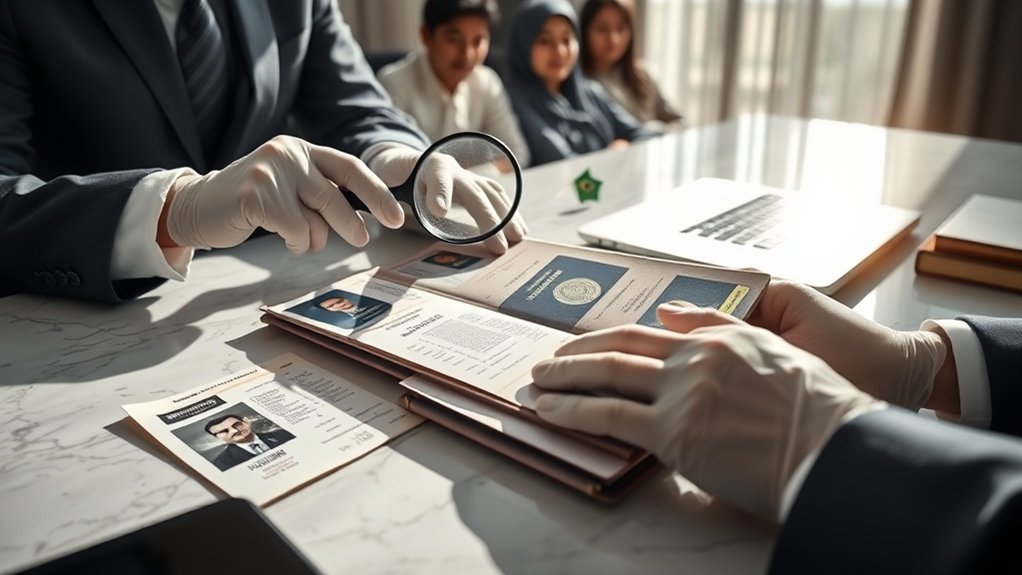When you’re seeking humanitarian admission to Brazil as an Afghan national, you need more than just hope—you need precision. Vieira Braga Advogados takes a thorough look at your paperwork, family situation, and personal risk to make sure you’re eligible under Brazil’s evolving policies. They don’t just check boxes; they anticipate what officials require. But before you see how they navigate complex hurdles and legal nuances, there’s one crucial step you’ll want to understand first.
Understanding the Humanitarian Admission Program for Afghans

How does Brazil support Afghans seeking safety? You’ll find that Brazil offers a specialized Humanitarian Admission Program tailored for Afghans and their families affected by crisis. Through this initiative, you can apply for a humanitarian visa that allows entry into Brazil and access to essential protection. The program doesn’t just issue a visa—it ensures you can live, work, and integrate into Brazilian society upon arrival.
If you’re eligible, you’ll receive legal permission to reside and work, plus access to basic services such as education and healthcare. The goal is to provide you with a new start in a safe environment, while recognizing the unique vulnerabilities Afghans face. Brazil aims to make the process direct, focusing on humanitarian values rather than strict immigration policies. By joining this program, you’re not only seeking safety—you’re also gaining support to rebuild your life in a welcoming country. Attorneys at Vieira Braga Advogados can ensure proper documentation gathering and help streamline your application, maximizing your chances for a successful immigration process.
Analyzing Government Guidelines and Updates
Although immigration policies often shift in response to global events, Brazil has consistently updated its guidelines to ensure Afghans receive timely and effective support. You need to stay attentive to these evolving government rules, as new provisions highlight Brazil’s commitment to humanitarian protection. The authorities regularly release official updates through the Ministry of Justice and the National Immigration Department, clarifying eligibility criteria and adapting procedures to current circumstances.
When you analyze these updates, focus on recent resolutions or ordinances that outline specific requirements for Afghan applicants. Examine how Brazil addresses urgent needs, such as streamlined processing for family reunification and prioritizing vulnerable individuals. You should review the latest bulletins, as they detail admissible categories and special pathways for Afghans facing risk. By keeping yourself informed, you’ll ensure that your application aligns precisely with official guidance, increasing your chances of approval. Accurate interpretation of every update is crucial for a successful humanitarian admission process. Seeking specialized legal support can further protect you from errors or misinformation when navigating complex immigration requirements.
Reviewing Applicant Identity and Documentation

Before you submit your application for humanitarian admission to Brazil, you’ll need to gather and verify all essential identity documents. Start by ensuring your Afghan passport or national ID reflects your current information—name, date of birth, and family details. If you lack a passport, alternative forms like a tazkira or even birth certificates are acceptable, as long as they’re genuine and unaltered. Double-check for clear, legible scans or photographs, since blurry or incomplete documents could slow your application.
Next, review any supporting documentation. This might include official correspondence, residency permits, or evidence of prior asylum claims. Make sure names and details match exactly across all documents to prevent any confusion or suspicion during the eligibility review. Don’t forget to certify translated documents if they’re not in Portuguese or English. Carefully organizing and presenting these materials increases your chances of a smooth, timely review by the Brazilian authorities. Working with an attorney ensures your documents and application adhere to all Brazilian immigration laws and reduces the risk of delays or rejections.
Assessing Family Composition and Vulnerability
You’ll need to clearly identify each family relationship in your application, showing how everyone is connected. Pay attention to any vulnerability indicators, such as medical needs or young dependents, since these can affect your eligibility. Make sure you include proper documentation for each dependent to avoid delays in processing. Engaging an immigration lawyer provides specialized support that helps avoid errors and ensures compliance with Brazilian laws throughout the admission process.
Identifying Family Relationships
How do authorities determine which Afghan families are eligible for humanitarian admission to Brazil? You must clearly prove the existence and nature of your family relationships. Officials require documents such as birth certificates, marriage licenses, or legal guardianship papers. These help confirm connections like spouses, children, or dependent relatives. If you lack documents, you can provide alternative evidence—affidavits, photographs, or written statements from community leaders sometimes suffice. Authorities also check the consistency of your narrative during interviews or in your application. Make sure all details align.
You’ll need to define your household’s composition precisely—list everyone who relies on you and clarify how they’re related. When you provide clear, credible proof of your family unit, you strengthen your chances of being considered for admission to Brazil’s humanitarian program. It is especially important to ensure your documents meet Brazil’s requirements, such as being translated and registered with the Federal Police within the specified period after arrival.
Evaluating Vulnerability Indicators
When authorities review your application, they don’t just look at who’s in your family—they also consider your household’s unique vulnerabilities. They’ll assess if your family includes children, elderly people, pregnant women, or members with health issues. Evaluating these factors helps identify those at greatest risk and who might need prioritized protection.
For example, a young child or a pregnant woman in your family increases the level of vulnerability, making your case stronger. Authorities also look at social circumstances, such as whether you’re a single parent or if there are unaccompanied minors. Consider how these elements may apply to your household:
| Age Groups | Special Needs | Social Status |
|---|---|---|
| Children | Chronic Illness | Single Parent |
| Elderly | Disability | Unaccompanied Minor |
| Pregnant Women | Medical Care | Widowed |
Understanding possible legal and bureaucratic issues in the immigration process can further help you anticipate documentation requirements and reduce the likelihood of delays in your application.
Documentation for Dependents
After assessing vulnerability indicators in your household, authorities require proof to support your claims. You’ll need to gather official documents for each dependent—spouses, children, parents, or others under your care. Birth certificates, marriage certificates, and legal guardianship papers help confirm family relationships. Don’t forget to translate these documents into Portuguese and ensure they’re certified to meet Brazilian requirements.
In addition, evidence such as medical records or disability certificates demonstrates the specific vulnerabilities your dependents face. These records allow authorities to understand the depth of your family’s needs. Keep all documents organized, since incomplete or inconsistent submissions can delay your case. By providing complete, well-prepared files for each dependent, you strengthen your application for humanitarian admission to Brazil and prove your eligibility more convincingly. Seeking help from specialized legal assistance can further reduce risks of documentation errors or missed requirements in this process.
Evaluating Proof of Risk and Urgency
When you apply for humanitarian admission to Brazil, you must show clear proof that you’re facing real and urgent risks. You’ll need to present documents that support claims of threats or imminent danger to your safety. It’s essential that officials can verify this information quickly and accurately. Consulting an immigration lawyer can be especially valuable, as their specialized knowledge helps ensure your evidence is both compelling and properly organized.
Assessing Threat Documentation
How can you convincingly demonstrate your need for urgent protection? To confirm eligibility for humanitarian admission to Brazil, you’ll need solid documentation detailing the threats you face. The Brazilian authorities want to see clear, specific evidence showing your situation is critical and immediate. Assessing your threat documentation is a crucial step, and you should prepare your materials carefully to build a strong case.
Consider including the following in your submission:
- Official letters or warnings issued by Taliban-affiliated groups
- Police reports documenting incidents or filed complaints
- Medical records showing injuries related to persecution
- Witness statements that describe threats or attacks against you
- Media articles mentioning your name or specific risk factors
Organizing this evidence ensures your claim for urgent protection stands out and meets Brazil’s strict humanitarian criteria. Seeking expert legal guidance can help you navigate complex immigration requirements and significantly improve your chances of a successful application.
Verifying Imminent Danger
Imminent danger demands compelling, up-to-date proof that your life or freedom is currently at risk. When you request humanitarian admission to Brazil, you’ll need to show credible evidence verifying the urgency of your situation. Don’t rely on general allegations or old incidents—focus on recent, concrete threats. Collect detailed statements, official reports, or communications that demonstrate you’re in immediate jeopardy. If targeted by specific groups, include documentation naming those groups and confirming their involvement. Time-sensitive information strengthens your application, so emphasize recent incidents over historical patterns. Vieira Braga Advogados helps you organize and present these materials in a clear, persuasive manner, ensuring authorities grasp both the current risk and the need for urgent protection as you seek safe refuge in Brazil. By working with specialized legal support, you can avoid common immigration risks including delays, denials, and errors that could endanger your application.
Verifying Afghan Nationality and Residency History

Wondering what evidence you’ll need to prove your Afghan nationality and residency history? When applying for humanitarian admission to Brazil, you must show reliable documentation confirming your identity and your life in Afghanistan. Brazilian authorities want to clearly see your Afghan citizenship and that your principal residence was in Afghanistan before seeking admission. Focus on assembling official documents, as originals carry more weight. If you’re missing documents, Vieira Braga Advogados can help you explain the gaps and prepare alternative forms of evidence.
Here’s what you should gather:
- Afghan national identity card (Tazkira) or passport
- Official birth certificate issued in Afghanistan
- Old utility bills or rental agreements from an Afghan address
- School records or graduation certificates from Afghan institutions
- Letters or affidavits from local authorities or community leaders in Afghanistan
Collect as much as you can. Your documentation helps confirm your eligibility and speeds up the process. Ensure everything is translated and correctly certified.
Addressing Special Needs and At-Risk Groups
If you or your family members have special needs or belong to at-risk groups, Brazil’s humanitarian program offers specific protections and support. This includes individuals facing medical issues, disabilities, elderly family members, single parents, pregnant women, or unaccompanied minors. As part of the eligibility process, you’ll need to clearly document these circumstances with supporting evidence, such as medical reports or statements describing vulnerabilities. Brazilian authorities prioritize applicants whose conditions or risks require urgent intervention, so it’s crucial to present accurate details.
Vieira Braga Advogados will guide you in organizing all necessary documentation and highlighting factors that increase your risk or need. Their experience ensures your unique situation receives careful consideration, helping increase the likelihood of approval. If your case involves trauma, persecution, or vulnerability due to your identity or personal situation, inform your legal team promptly. By thoroughly addressing these needs, you ensure your application reflects your circumstances and maximizes available support and protections.
Managing Language Barriers and Legal Communication

Although moving to Brazil brings hope for a safer future, language differences can make the legal process challenging. You might feel overwhelmed by Portuguese documents or official interviews. That’s why clear legal communication matters, especially when your status and rights depend on it. Vieira Braga Advogados helps bridge these gaps, making it easier for you to understand and participate in every legal step.
Here’s how you can manage language barriers during your humanitarian admission process:
- Work with translators or interpreters familiar with legal terms.
- Request all key documents in both Portuguese and your spoken language.
- Prepare important questions or points ahead of any legal meeting.
- Use plain language—don’t hesitate to ask for clarification if something’s unclear.
- Communicate directly with your legal representative about any language difficulties.
Preparing and Organizing Supporting Evidence
Everyone seeking humanitarian admission to Brazil must gather convincing evidence of their circumstances. You’ll need to assemble documents that clearly show the reasons for your request and your eligibility for protection. Start by collecting identification, proof of Afghan nationality, and records that detail recent threats or persecution. Organize your evidence into logical categories so officials can quickly understand your case.
You should keep your documents well labeled and make digital copies. If some documents need translation, ensure they’re certified and accurate. Below is a guide to help you recognize the kinds of evidence most applicants need:
| Type of Evidence | Purpose |
|---|---|
| Identification documents | Prove your identity and Afghan nationality |
| Threat/persecution letters | Show specific risks you’ve faced |
| Family and travel records | Support your family ties and movements |
Being meticulous about your evidence will increase your chances of success. Document everything—you never know what might prove essential.
Guiding Applicants Through the Submission Process

Once you’ve collected and organized your documents, it’s time to submit your application for humanitarian admission to Brazil. Vieira Braga Advogados will guide you through each step to make the process as smooth as possible. They’ll ensure your documents are complete, verify translations if needed, and help you understand the specific requirements for Afghan applicants seeking humanitarian protection.
To make the submission process easier, remember to:
- Confirm all documents are correctly filled out and signed.
- Double-check that any translations are certified and attached.
- Submit digital copies if required by Brazilian authorities.
- Make note of deadlines, as late applications can lead to rejection.
- Keep copies of all documents and receipts for your records.
Your legal team will also keep you updated about your application’s status and any further requirements requested by the authorities. With their guidance, you won’t miss critical steps, improving your chances of a successful outcome.
Frequently Asked Questions
How Long Does the Application Process Usually Take From Start to Finish?
You should expect the application process to take several months from start to finish, though specific timelines can vary. Typically, you’ll spend a few weeks gathering your documents and preparing the application. Once you submit everything, authorities might take anywhere from four to twelve months to review your case and issue a decision. Delays can happen, so it’s important to stay proactive and respond quickly to any additional requests for information.
What Happens if My Application Is Denied—Can I Appeal the Decision?
If your application is denied, you can usually file an appeal. You’ll receive a notice outlining the reasons for the refusal and the steps you need to take to contest the decision. Make sure you act quickly—there’s often a deadline for submitting an appeal. You may need to provide additional documents or clarification. It’s advisable to seek legal guidance to improve your chances if you decide to appeal.
Are There Fees Associated With Vieira Braga Advogados’ Services?
Yes, you’ll usually encounter fees when using Vieira Braga Advogados’ services. Legal advice, document preparation, and application support often involve costs that depend on the complexity of your case. It’s a good idea to request a detailed fee structure upfront so you know what to expect. You might also want to ask if initial consultations are free or if they’ll be included in the overall service package before moving forward.
Does Humanitarian Admission Lead to Permanent Residency or Citizenship?
Humanitarian admission doesn’t automatically lead to permanent residency or citizenship in Brazil. You’ll receive temporary resident status, allowing you to live and work in the country. After a specific period, often a few years, you can apply for permanent residency if you meet the requirements. Citizenship is a separate process that usually requires permanent residency, language proficiency, and other criteria. So, you’ll need to follow Brazil’s legal steps for long-term status.
Will I Receive Support With Housing Upon Arrival in Brazil?
You may receive some initial support with housing when you arrive in Brazil, but it’s not guaranteed for everyone, and the level of assistance can vary. Government agencies or NGOs often help newly arrived humanitarian admission holders find temporary accommodation or shelter. However, you should prepare to search for long-term housing yourself. Reach out to local support programs, as they can guide you and provide resources during your transition.
Conclusion
With Vieira Braga Advogados by your side, you’ll navigate Brazil’s Afghan humanitarian admission process with confidence. Their team ensures your documents are flawless, your vulnerabilities are clearly presented, and all guidelines are strictly followed. You won’t have to face language barriers or paperwork headaches alone. Trust their expertise to help you prepare and submit the strongest possible application, increasing your family’s chances of a safe, approved entry into Brazil when you need refuge most.



